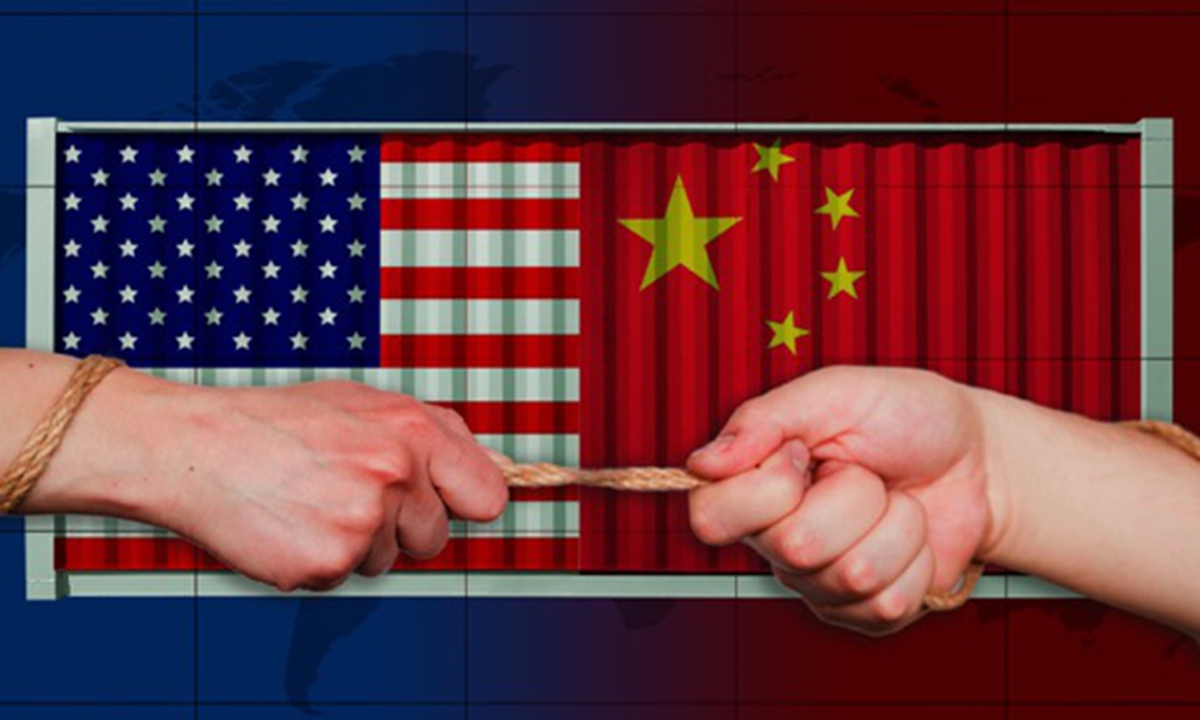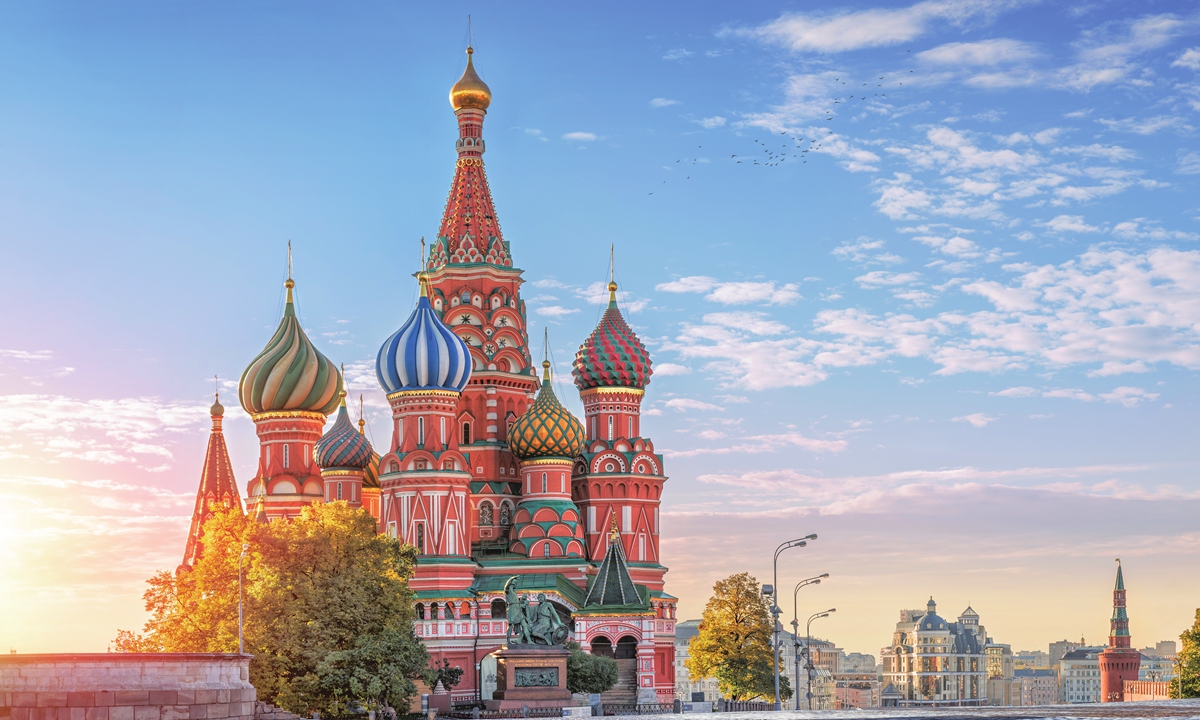US only satisfied with big countries as satellites: Russian scholar
By Xie Wenting and Bai Yunyi Source: Global Times Published: 2020/9/1 17:58:42 Last Updated: 2020/9/2 14:36:42

China US Photo: GT
Editor's Notes:
Relations between China and the US have hit the lowest point in 40 years amid US efforts to contain China's rise. Some scholars voiced concern there is an ongoing new cold war between China and the US comparable to the 20th century hostilities between the US and the USSR. Is the "new cold war" an appropriate term to describe the current tensions between China and the US? What lessons can Russia, which has decades of experience of power play with the US, offer to China? Global Times reporters Xie Wenting and Bai Yunyi (GT) interviewed Alexander Lukin (Lukin), head of Department of International Relations at HSE University and director of Center for East Asian and SCO Studies at MGIMO-University of the Russian Foreign Ministry, on these topics.
GT: Many experts use the term "new cold war" to compare frictions between China and the US with the Cold War between the US and the USSR. As a Russian scholar, what's your take on this?
Lukin: Experts usually define the Cold War as a historically lengthy period of geopolitical and ideological rivalry between the US and the Soviet Union and their allies which began soon after the end of the WWII and ended when Mikhail Gorbachev changed Soviet Union's foreign policy and later the Soviet Union collapsed. At that time the two countries were the strongest political and economic actors in the world and they led big coalitions of states to divide the world into two big spheres of influence.
The US and China are entering into a similar lengthy period of geopolitical confrontation which began under former US President Barack Obama but was officially and openly proclaimed by President Donald Trump. Now China is militarily weaker than the US, but one should bear in mind that the Cold War started when the Soviet Union was also much weaker than the US and did not even possess nuclear weapons. Only much later Moscow achieved strategic parity. So, I believe, it is fair to call this situation a new cold war.
However, this new cold war is different from the first one. The main difference is that it is waged unilaterally by the US. The Soviet Union and the US were both striving for world domination. Both warring camps had ideologies which proclaimed that in the end their respective political and economic systems were going to win over the entire world because they were more progressive than all others. They believed that they were on the right side of history. On the part of the US, its final goal was an ideal society built on was what they called democratic system and the market economy. On the Soviet part it was communism.
Now the situation is different. The totalitarian ideology of the final solution to all world economic and social problems is kept only by the US and its allies. China has no such global aspirations. It is not trying to impose its political and economic system on the entire globe or expand its sphere of influence on it. The US is waging the new cold war unilaterally, while China is just trying to protect itself and its economic interests. The current cold war is of a new type and it's a unilateral cold war.

Church of the Savior on Spilled Blood in St. Petersburg, Russia Photo:VCG
GT: The US closed the Chinese consulate in Houston, imposed sanctions on many Chinese officials, and cracked down on Chinese companies. The US took similar measures against Russia before. How will the latest US provocations affect China-US relations?
Lukin: The confrontation which the US started with both Russia and China has some similarities. Washington sees Moscow and Beijing as both geopolitical and ideological rivals. However, from the point of view of most US strategists, China is a more dangerous threat since it is economically prosperous and undermines a major tenet in American ideology - the belief that economic prosperity inevitably comes together with accepting the Western "democratic" political model. Therefore, the anti-Chinese measures by the US government should be understood not as something extraordinary but as a sign of a new normality. More such and similar measures will follow.
China has to learn how to live in this situation and stop expecting that the old time will come back. It does not mean that temporary thaw periods are impossible. The US-Soviet Union cold war saw various periods which differed significantly in terms of the intensity of confrontation. But a general confrontational trend will be there for a long time until either side changes fundamentally or disappears altogether.
GT: What lessons and experiences has Russia drawn from power play with the US? Do you have any advice for China today?
Lukin: The reason for the confrontation with the West is only partly ideology, but mostly about geopolitics. This means that there is no way for a big country to fully satisfy the US elite unless it decides to unconditionally recognize the US leadership and become its satellite.
In early 1990s, Russia changed its political and economic system and even became smaller. However, even all these changes turned out not to be enough for the US. Russia's first attempts to ask for a proper place in the Western family of nations which it was willing to join, or to claim an active role in solving internal conflicts in the neighboring countries led to misunderstandings and later to confrontation.
Since the end of the Cold War, all Russian leaders at first wanted to improve relations with the West and later became disillusioned. It turned out that the only option for a big country to maintain independence is to be prepared for a lengthy period of strained relations with the US. After the collapse of the Soviet Union, Washington got used to living in the world which it entirely dominates. And it is struggling to maintain this situation.
This goal is impossible to achieve, but the very attempt to achieve it makes the world a very dangerous place. This situation will only change when the US again learns how to coexist with other big powers without undermining the international stability. It could do it before the collapse of the Soviet Union, but it forgot how to do it since that time. In the meantime, Russia and China, as well as other non-Western centers of power need to learn how to survive and cooperate with each other to overcome their problems, while keeping the door open to cooperation with the US on equal and mutually beneficial terms.
GT: Is there a possibility of a military conflict between China and the US?
Lukin: A military conflict is generally unlikely. It can only be started by the stronger side, that is, the US. But Washington still understands that it will be highly counterproductive. Both countries possess nuclear weapons. There will be a lot of casualties and the result is unclear.
However, there are several possibilities for an unintentional breakout of a hot conflict. First is a possible escalation of a clash, for example, in the Taiwan Straits or in the South China Sea. Another possibility is real lunatics like supporters of the QAnon conspiracy theory or some kind of radical anarchists come into power in the US.
GT: US Defense Secretary Mark Esper said the US is "now in an era of great power competition and China, then Russia, constitute our top strategic competitors." What are the implications of this statement for the global order?
Lukin: The implication would be a lengthy period of confrontation. This confrontation is going to be an integral feature of the global order for the foreseeable future. China and Russia are very different countries. The only similarities between them are that both are big countries and do not want to become part of the US sphere of influence. Besides, their political systems are different from that of the US. These are three major factors which, if put together, make any country a US rival.
GT: Do you think the latest moves made by the Trump administration against China are aimed at his reelection bid, or are they part of a new strategy with China? How will the either candidate's victory affect China-US relations?
Lukin: These moves are part of the general US strategy. However, the elections may play a role since Trump is specifically playing an anti-China card. He is trying to make China a scapegoat for his own mistakes, such as mishandling of the COVID-19 crisis and the US economic problems. The time prior to elections may be an especially dangerous period when Trump may take some radical anti-Chinese measures only to serve his electoral goals.
GT: What do you think will happen to China-US relations if Joe Biden gets elected? And what will happen if Trump gets reelected?
Lukin: I don't believe that there could be a serious change in the general confrontational course toward China even if Biden is elected. Both major US parties share the belief that China is the reason for US economic problems. And this is understandable. China showed that it was more effective economically. But from the point of view of the dominant US ideology, US economic problems cannot be blamed on its economic system because it is superior by definition. There must be some unfairness, a trick or cheating on the Chinese side. For that, China should be punished. Besides, even if Biden comes to power and decide to improve relations with China, the Republican opposition will try to sabotage this policy by accusing him of collusion just like Democrats sabotaged Trump's attempts to improve ties with Russia. So I think in both cases, the general course will remain anti-Chinese although with some minor differences.
GT: Some national security strategists have argued the US should work with Russia to counter China. Will Russia consider switching to the US side? How do you evaluate Russia-US relations?
Lukin: This is absolutely impossible. After the US supported the anti-government coup in Ukraine in 2014 and adopted sanctions against Moscow, the Russian leadership became so disillusioned with the US that any kind of trust is impossible. The US is seen as an unreliable partner with whom only some tactical and pragmatic agreements are possible. To get Russia on its side the US will have to dismantle its entire system of sanctions and recognize Russia's interests at least near its borders. Washington will never do this. The current state of US-Russian relations is arguably the worst in almost a century, at least since the establishment of diplomatic relation between the US and the Soviet Union in 1933.
But Russia learned how to survive under the US and European sanctions and they generally did not influence the economic situation or the well-being of the Russian people. I don't foresee any significant improvement in the foreseeable future, although some specific agreements could be reached.
Newspaper headline: Cold interpretations
RELATED ARTICLES:
Posted in: IN-DEPTH